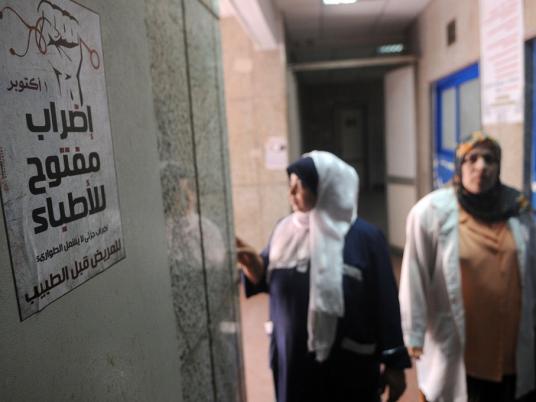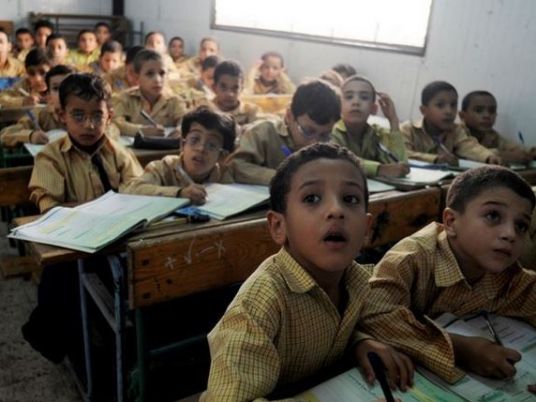
Last week, protesting doctors launched a mass resignation campaign to escalate their ongoing strike. Mona Mina, a member of the strike’s general committee and the Doctors Without Rights movement, says they would not submit anything less than 15,000 resignations.
The strike’s general committee announced Monday that the partial strike would continue through Eid al-Adha, but would not grow into a full strike so that poor patients would not suffer, Al-Masry Al-Youm reported. In a statement, the leadership committee said the Health Ministry is referring doctors to investigation because they insist on providing proper emergency services to patients and conducting necessary tests free of charge.
Doctors have staged several protests this month, the most recent of which was organized on Sunday in front of the Health Ministry in Cairo. Approximately 300 doctors gathered for the protest and were joined by members from different political powers. Doctors climbed up the gates of the ministry and tampered with the sign reading “Ministry of Health,” spraying words such as “corruptors” on it.
The doctors’ strike, which started on 1 October after being approved on 21 September at a Doctors Syndicate emergency general assembly meeting, has now entered its fourth week as doctors vow escalation and the Health Ministry claims to be working to meet their demands. The doctors are calling for raising the health budget allocations from 4.5 percent to 15 percent of the total state budget, reviewing the administrative and financial conditions of the sector and providing better security for hospitals.
In terms of duration, this strike comes in second only to the 50-day long medics’ strike that followed the 1952 military coup.
Amr al-Shoura, a member of the strike’s general committee and of Doctors Without Rights, says, “Today, we have decided to brush aside our differences and unite in the face of the Health Ministry’s disregard of our demands despite the success of our strike, which is entering its fourth week.”
There has been discord amongst the protesting doctors, with some charging the Muslim Brotherhood-controlled Doctors Syndicate of not wholeheartedly supporting the strike. However, Shoura says that some Muslim Brotherhood members of the syndicate did in fact participate in the strike.
Intern doctors have also joined the cause, launching their own campaign to collect the signatures of interns who have decided not to accept assignments after graduation before the demands of the strikers are satisfied.
“Approximately 6,000 doctors graduate every year from medical schools. If half of them reject assignments, this will spell major trouble for the ministry,” Shoura says.
Ehab al-Taher, Doctors Syndicate treasurer and a member of the strike’s general committee, described the government’s promises as “empty,” claiming the ministry was merely giving the impression that it cared about restructuring the placement scheme of doctors, when in fact no emergency meeting was held to deal with the strike.
“The ministry believes that having the cadre committee [charged with reviewing terms of employment] convene twice a week instead of once is a great achievement, and then claims that it cares about the patients,” Taher says. “If that was the case indeed, the ministry’s crisis committee would have convened until a solution was reached.”
Al-Masry Al-Youm reported that while Parliamentary Affairs Minister Mohamed Mahsoub Abdel Meguid on Monday said the health minister agreed to meet with the strike’s leadership, Assistant Health Minister for Insurance Ibrahim Mostafa denied the meeting.
“There is no political will to solve the problems of the health sector because the private sector mafia benefits from the decrepit health system,” Taher says.
“In Egypt, there are people who will sell their home furniture and gold jewelry to get treatment at a private hospital because they hate public hospitals, and they have every right. Owners of big private hospitals are on good terms with state officials, and some of them are state officials who belonged to the former regime or are part of the current one.”
Taher adds that the Health Ministry’s salary budget, which amounts to LE13 billion, could be distributed in a fair way to the 250,000 workers in the health sector, such that cleaners get LE1,200, doctors LE4,000 and top ministry officials LE70-80,000 a month.
“When we compared the budgets of 2009/2010 and 2011/2012, we found that there was an increase in salary allocations worth LE8 billion in the latter. Where did this money go?” Taher asks, adding that there was another LE3 billion allocated to allowances, money which he claims goes to the minister and his aides, whose number does not exceed 200.
Despite the fact that increasing the health budget is at the top of the doctors’ demands, Mina says they have made it clear that solutions are still possible using the same allocations in the health budget.
“There are heavyweights who want to swallow the whole ministry’s budget, and we want to tell them that these conditions will not continue. We will not return to the situation where the salary is nominal and the treatment is fake. The poor patients are paying the price for this tragedy,” says Mina.
Dr. Bahaa al-Deen Mohamed, a member of the Health Ministry’s crisis committee, says many of the budget figures circulating may not be correct. He adds that the ministry has taken serious steps to satisfy the doctors’ demands, claiming that the cadre committee has finalized 95 percent of the draft placement law which will be submitted to the president within days.
This draft law consists of a series of regulations pertaining to hiring, promotions and salary grading of doctors working in public institutions.
Mohamed adds that the ministry has obtained President Mohamed Morsy’s approval to increase the health budget by 2 percent annually until it reaches 14.7 percent in five years. Additionally, he claims that following consultations with the Interior Ministry, a department was established to protect hospitals. This department has allegedly already begun its work in some governorates.
“The real crisis is caused by the doctors’ lack of confidence in the ministry. The doctors fear that the ministry will only give empty promises and do nothing,” says Mohamed.
The ministry recognizes the legitimacy of the doctors’ demands and their right to strike, and is not working to ruin their strike but only to intervene to help patients when it senses danger, Mohamed continues.
Mina disagrees. “The ministry’s only response to our demands is defamation campaigns, lies and investigations of doctors. One of the doctors in the fever ward was referred to investigation because she wanted to have a patient undergo a lab test for free. She was conforming to Health Ministry laws which state that the emergency and fever departments can do tests for free.”
Doctors on strike have now decided to treat patients coming to emergency and fever departments for free.
Mina continues, “There is no going back. The strike will continue for as long as it takes and we will not harm the patients and our consciences are clear. It is impossible to go back.”
Translated from Arabic by Dina Zafer




